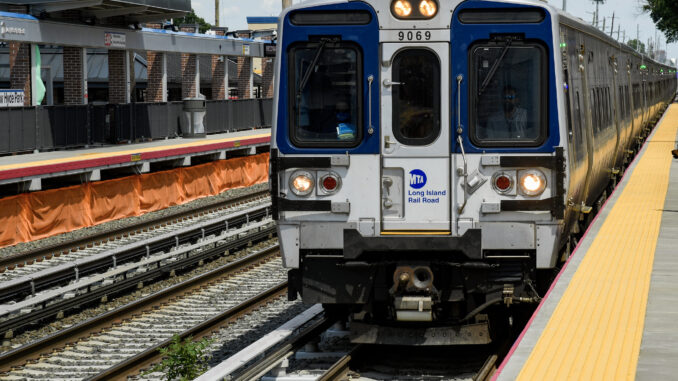
By Hank Russell
Two pieces of legislation that involved the Metropolitan Transportation Authority (MTA) — introduced by two Republican state lawmakers — were left stranded in committee during votes on May 28. One said his legislation called for accountability and transparency in the MTA, while the other said his bill would have resulted in greater safety aboard the trains.
The first piece of legislation, introduced by Assemblyman Ed Ra (R-Franklin Square), that would require a comprehensive forensic audit and a top-down overhaul of the MTA. Ra said his bill was held by Assembly Democrats in the Corporations Committee, effectively blocking the legislation from advancing to a full vote in the state Assembly.
This legislation would require the MTA to hire a certified, independent accounting firm to conduct a comprehensive forensic audit. The audit, according to Ra, would produce a report highlighting inefficiencies, redundancies and areas ripe for reform — laying the groundwork for long-overdue accountability.
Ra listed some of the examples of waste and inefficiency by the agency:
- more than $5 billion in unpaid tolls from 2021 to 2024
- more than $700 million lost to fare evasion in 2022. That number approached $800 million in 2024.
- nearly $8 billion spent on flood-resilience projects after Superstorm Sandy failed to prevent basic issues like broken flood door gaskets.
- more than 300 MTA employees earned at least $100,000 in overtime in 2022, and 734 employees earned more in overtime than in regular pay
“More than 65 million people rely on the MTA. To get everyone where they’re going safely and efficiently, there has to be some level of accountability. Today, our state leaders made it clear they’d rather keep throwing money at a broken system than take a serious look at fixing it,” said Ra.
“We passed a record-breaking $254 billion budget this year, a sizeable slice of that earmarked for the MTA. They receive billions of taxpayer dollars, but where that money is going is as much my guess as yours. It’s certainly not going toward fixing the chronic mismanagement and dysfunction that plague the system. To refuse even a basic, independent audit is outrageous. Transparency shouldn’t be controversial.”
The second bill came from Assemblyman Daniel Norber (R,C-Great Neck) that would provide free Long Island Rail Road (LIRR) fares for Nassau County auxiliary police volunteers. On May 28, the Corporations, Authorities and Commissions Committee voted 17-8 along party lines to hold the bill in committee.
By passing this law, protection and safety of commuters on the LIRR would be increased, according to Norber. Additionally, he said men and women who serve the auxiliary police of these areas should not have to incur the added cost of paying for the LIRR for their commute.
“The Albany super-majority stifled [my bill], denying auxiliary police the relief they deserve,” Norber said. “This single-party dominance in Albany ignores Long Island’s needs by silencing a bill that would enhance commuter safety and fairness. This is an abuse of power and an obstruction of democracy to not even allow debate on a perfectly reasonable bill. This totally dismisses the voices of Long Islanders.”
Norber added that the bill’s suppression in committee highlights New York City-centric politics overriding statewide equity, leaving volunteers and commuters to bear the cost of a flawed policy.
In response, Charles Lavine (D-Glen Cove) said, “It is ironic to put it mildly that while [President] Trump is doing his best to bankrupt New York as a result of monstrous federal funding cutbacks, his Republican sycophants now muster the political courage to propose free lunch for all.”
Later that day, at a press conference attended via Zoom, Long Island Life & Politics asked MTA Chairman/CEO Janno Lieber about the aforementioned bills. Lieber said he couldn’t comment on the legislation, since he was unfamiliar with them. Rather, he discussed the positives, such as 97% on-time performance on the LIRR, an increase in customer satisfaction and a 40% increase in service, the latter he said was the result of the Third Track, which “was executed over the objections of many of those legislators who just put in those bills.”
Lieber said he is glad to see the train service “developing,” adding, “[These legislators] really need to account for why they were really against increasing Long Island Rail Road service before they start talking about other stuff related to the railroad.”

